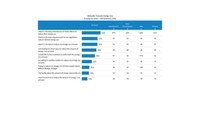Americans Care About Emissions, but Underestimate Their Own Home's Contribution to Climate Change
- Consumers see importance of reducing their carbon footprint and are taking steps to reduce energy consumption
- Nearly half are looking to smart technology at home for solutions to help reduce their residential energy use
- Still, most believe industrial facilities and transportation are more responsible for carbon emissions; fewer recognize the impact of residential buildings
BOSTON, Dec. 10, 2020 /PRNewswire/ -- Schneider Electric, the leader in the digital transformation of energy management and automation, today announced findings from a new survey that examined the attitudes of consumers toward climate change, energy use and smart home technology. The survey found that while the majority of Americans view carbon emissions as a threat, they do not realize the role their homes play in energy usage and emissions.
According to the survey, Americans place higher responsibility on industrial facilities and transportation for carbon emissions, compared to their own homes. Less than 1-in-10 rank residential buildings as the top contributor. Further, most place responsibility on government and corporations to reduce energy usage rather than on themselves. Yet, research from the U.S. Energy Information Administration found that residential buildings are set to soon become the largest consumer of electricity globally1. This trend is accelerating with the COVID-19 pandemic prompting the shift to work from home, resulting in increased electricity usage.
"As a country, we do not realize the impact our own individual actions have on emissions," said Richard Korthauer, Vice President, Home & Distribution US, Schneider Electric. "Our homes are top CO2 contributors, and we must all work together to take steps to reduce our energy consumption at home through energy efficient investments and smart tech. We believe the home of the future must be fully sustainable, and smart technology makes that possible. In our vision for the Sustainable Home of the Future, every household can view, manage and track their home's power using a single device, seamlessly integrated into the home, to provide peace of mind without sacrificing comfort."
Incorporating smart technology into the home may play a crucial role in offsetting energy usage. The survey found that, on average, U.S. consumers believe it is important to reduce the energy used in their homes and are willing to invest about $3,100 on energy efficient home improvements in the next three years.
Additional Key Findings:
- About three-quarters of consumers (73%) expend at least some effort to reduce energy usage by turning off unneeded lights and electronics.
- Boomers lead other generations in top methods of home sustainability: 80% report they turn off lights/electronics when not in use (compared to 64% of Millennials). However, Millennials are more likely to have made bigger investments in energy reduction and sustainability: over a third (36%) have purchased a smart thermostat and a quarter (25%) have installed solar panels/a renewable energy source at their home.
- Half of consumers (51%) believe smart home products should be standard in newly built homes.
- Top purchase motivators for smart tech include lower energy costs (67%), home safety (54%), and home security (53%).
- Younger generations are highly familiar with smart home technology. Over half (57%) of Gen Z and 60% of Millennials report being extremely or very familiar. This signals that as Millennials and Gen Z age into buying their own homes, smart home technology adoption is likely to increase.
- The Boomer generation is happiest with smart home technology purchases. In particular, they favor smart doorbells (96%), smart thermostats (91%) and voice assistants (88%).
- However, privacy concerns continue to remain a barrier to more than half of Americans (55%).
About the Report
The report findings are based on an online survey fielded from July 31, 2020 to August 11, 2020. A total of 4,000 consumers were surveyed, with 1,000 each from the United States, France, Germany and Sweden. Survey completes were balanced to match demographic proportions in each country for gender, age, income and ethnicity. The margin of error is plus or minus 3% for each country.
About Schneider Electric
Schneider's purpose is to empower all to make the most of our energy and resources, bridging progress and sustainability for all. We call this Life Is On.
Our mission is to be your digital partner for Sustainability and Efficiency.
We drive digital transformation by integrating world-leading process and energy technologies, end-point to cloud connecting products, controls, software and services, across the entire lifecycle, enabling integrated company management, for homes, buildings, data centers, infrastructure and industries.
We are the most local of global companies. We are advocates of open standards and partnership ecosystems that are passionate about our shared Meaningful Purpose, Inclusive and Empowered values.
Follow us on: Twitter | Facebook | LinkedIn | YouTube | Instagram | Blog
1 US Energy Information Administration, https://www.eia.gov/outlooks/ieo/pdf/ieo_infographics_3.pdf
SOURCE Schneider Electric

Related Links
WANT YOUR COMPANY'S NEWS FEATURED ON PRNEWSWIRE.COM?
Newsrooms &
Influencers
Digital Media
Outlets
Journalists
Opted In







Share this article